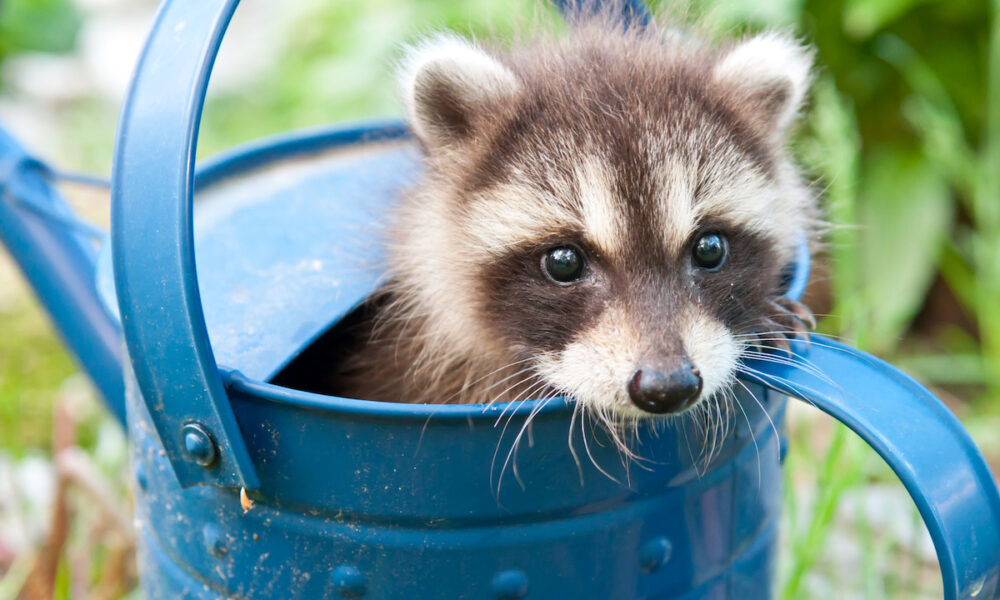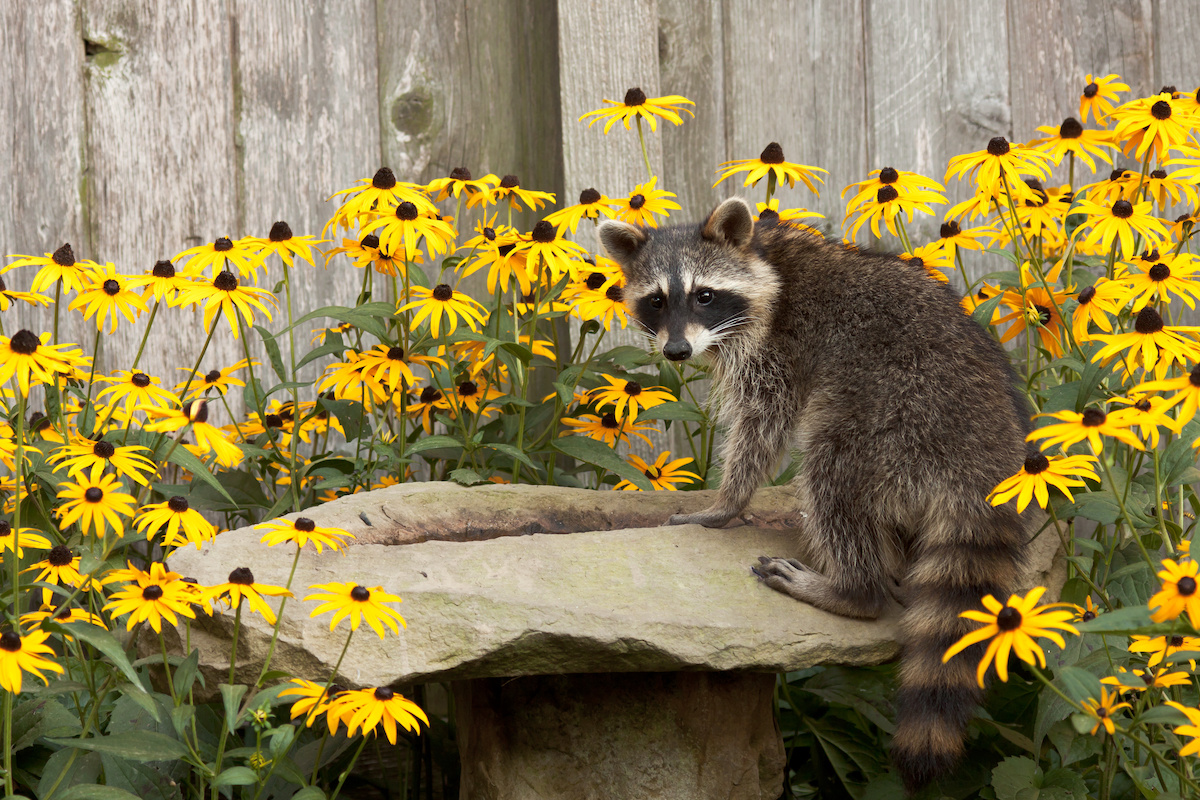
As we experience subtle seasonal changes here in Florida, not only do our gardens burst into life, as March signals the start of the planting tomatoes, cucumbers, and peppers. But did you also know that spring also marks the beginning of baby season for raccoons? Luckily, there are ways for raccoon-proofing your garden for your peace of mind.
These clever creatures, while fascinating to observe, can become unwelcome visitors in our gardens. That’s because they often wreak havoc in their search for food to feed their growing families. Here’s how you can protect your garden from raccoons this spring without harming these curious nocturnal animals.
Understand Raccoon Behavior: What they Like to Eat
When it comes to raccoon-proofing your garden, you’ll want to think about why they are attracted to it in the first place. Raccoons are omnivores and their diet in spring often includes fruits, vegetables, nuts, and insects. But yes–they’re also interested in eating your trash as well.
However, they are particularly drawn to gardens that offer easy access to food. Understanding this can help you take effective measures to safeguard your garden.
Signs that Raccoons are Invading Your Garden
Raccoons are clever and resourceful creatures that can turn your garden into their nightly buffet if given the chance. Recognizing the early signs of their presence can help you take timely action to protect your green space. Here are some telltale indicators that raccoons are frequenting your garden:
Disturbed Trash and Compost Bins
One of the most obvious signs of raccoon activity is disturbed trash and compost bins. Raccoons have nimble fingers and can easily open lids or even untie knots. If you find your bins toppled over or notice trash scattered around, raccoons are likely the culprits.
Damaged Plants and Vegetables
Raccoons are omnivorous and won’t hesitate to dine on your carefully tended vegetables and fruits. Corn plants are often knocked down, and fruits are picked and partially eaten. Look for signs of digging around plants, as raccoons also search for insects and worms to eat.
Footprints
Raccoon footprints are distinctive, resembling tiny human hands for the front paws and elongated feet for the hind. You might notice these tracks in the soil of your garden, around your compost area, or in any muddy spots near your garden.
Raccoon Droppings
Finding raccoon droppings in your garden is a clear sign of their presence. Raccoon feces are similar in size and shape to a small dog’s but may contain undigested food particles like seeds or insect exoskeletons. Be cautious, as raccoon droppings can contain harmful parasites—never handle them without gloves.
Nocturnal Noises
Raccoons are mostly active at night. Hearing unusual noises such as chittering, growling, or rustling in your garden after dark could indicate raccoons are at play or searching for food.
Overturned Decor and Displaced Soil
Raccoons are curious and will often explore anything that smells like food or contains water. Bird feeders, decorative ponds, and even potted plants can be tipped over or disturbed. Additionally, raccoons will dig in soil, looking for grubs and worms, leaving small holes or upturned earth behind.
Damage to Fences or Structures
Raccoons are strong and can tear apart wooden beams, shingles, or even vent covers to access food or shelter. Damage to fences, particularly near the ground or at entry points, can indicate raccoons are breaching your garden’s defenses.
Raccoon-Proofing Your Garden Starts with Keeping Raccoons at Bay
Since spring is raccoon baby season, they’ll be looking for areas to nest and keep their young safe. Raccoons prefer dark, quiet, and secure areas to set up their nests. Attics, chimneys, and under-deck spaces in residential areas can mimic the natural dens they seek out in the wild. This nesting behavior can lead to conflicts with homeowners as raccoons attempt to transform these parts of a house into their new home.
Some ways that you can keep raccoons at bay include the following.
Secure Your Trash Bins
Raccoons often venture into gardens because they offer a food source. Ensure your trash bins are securely closed at all times. Consider using bins with locking lids or strap them down to prevent raccoons from knocking them over and scavenging for food.
Install Fencing
A sturdy fence can be an effective barrier against raccoons. They are excellent climbers, so consider installing a fence that tilts outward at the top or is equipped with a roller bar that prevents them from getting a good grip. Electric fencing is also an option, but it should be used as a last resort and set up responsibly to avoid injuring the animals.

Protect Your Fruit Trees
Fruit trees attract raccoons. To protect them, wrap metal sheets around the trunk of your trees about 3 feet off the ground. This prevents raccoons from climbing up. Collect fallen fruits promptly to reduce temptation. This guide explains how to cut and use metal sheets around trees to protect them from raccoons.
Use Motion-Activated Sprinklers
Motion-activated sprinklers can startle raccoons away from your garden without causing them harm. These devices can be set up to activate only at night when raccoons are most active.
Keep Your Garden Clean
Maintain a clean garden. Raccoons are less likely to visit if there is nothing to eat. Clear away fallen fruits, secure compost bins, and cover water sources like ponds at night.
Create a Distraction
Consider creating a feeding spot far from your garden. By providing an alternative food source, you can divert raccoons away from your plants. This approach should be used cautiously, as it might attract more raccoons or other wildlife to your property.
How to Get Rid of Raccoons that are Ruining Your Garden
Despite your best attempts, you might not be successful at raccoon-proofing your garden. But the good news is that you don’t have to allow raccoons to run rampant in your garden space. You can get rid of raccoons, but you need to be mindful of Florida laws before moving forward.
If you want to get rid of raccoons that are ruining your garden, you can use live trapping as a last report. However, keep in mind that there are laws about trap and release of nuisance animals in Florida, including raccoons.
For example, trapped nuisance animals must be humanely killed or released on the same contiguous property where it was caught. You cannot transport them unless they are undergoing a euthanasia procedure.
Raccoons are a natural part of Florida’s wildlife and play an important role in our ecosystem. While they may visit our gardens, especially during spring, we can coexist with these fascinating creatures by taking steps to protect our plants without harming them. With a little effort, you can enjoy a thriving garden and appreciate the wildlife that shares our space.
The Easy Way to Get Rid of Raccoons in Your Garden
If you don’t feel up to the task of lawfully removing raccoons from your property, especially during baby season, the best thing to do is contact raccoon control. That’s us here at World Class Wildlife! You can count on us to properly remove raccoons from your property so they stop destroying your garden. Contact us today when you need help raccoon-proofing your garden as well as your home.
